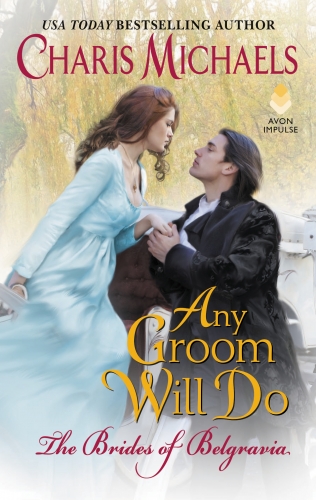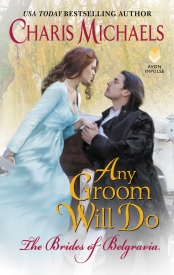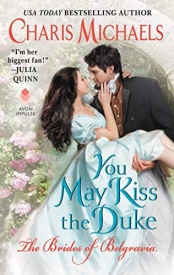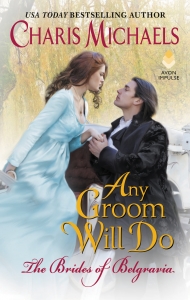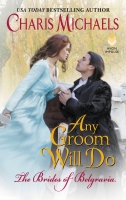
USA Today Bestselling Romance Author
Any Groom Will Do
Book 1 of the Brides of Belgravia Series
New friends and old favorites make appearances in this spinoff of the Bachelor Lords trilogy.
THE DREAMER
Lady Wilhelmina “Willow” Hunnicut has always dreamed of leaving tranquil Surrey for sights and sounds London. She is a talented designer and has aspirations as grand as London’s finest mansions. But an unmarried heiress dare not relocate to the capital city alone, and her parents have forbidden the move. A married woman, however, may come and go as she pleases, not a hint of scandal. With this in mind, Lady Willow writes an advertisement that offers her dowry to potential husbands as bait. She is determined to conveniently marry any man who will give her his name and then otherwise walk, ride, or sail away.
THE DESPERATE
Lord Brent Caulder, the Earl of Cassin, lives in one of the last-remaining castles in Yorkshire, but it is a castle in decline. The tenants are listless and destitute, his mother and sisters are barely getting by. It’s Cassin’s fault, unfortunately, because he’s sealed the dangerous mines that have brought the earldom prosperity for generations. Now he must discover a safe alternative or his people will starve.
THE DEAL
Relief comes in the form of an advertisement from a London investor. But when the “investor” is revealed to be a young woman and the money her dowry, Cassin must decide if he’s desperate enough to marry a stranger. The deal hinges on one stipulation: bride and groom will go their separate ways after the wedding and never look back.
THE DISCOVERY
When a family crisis forces the estranged couple to travel home to Yorkshire, Cassin seeks aid and solace from the new wife he barely knows. Lady Willow embraces the heated attraction that sizzles between them, and Cassin comes to see her as more than a financial backer, he falls in love with her as his wife.
Connected Books
Any Groom Will Do
Book 1 of the Brides of Belgravia Series
The full series reading order is as follows:
- Book 1: Any Groom Will Do
- Book 2: All Dressed in White
- Book 3: You May Kiss the Duke
Enjoy an Excerpt
Any Groom Will Do
Buy your copy →
Read or write reviews on Goodreads →
. . . . . .
Prologue
In the early spring of 1813, eight-year-old Lady Wilhelmina Hunnicut fell ill from a bout of peritonitis that nearly took her life. For ten days she lay contorted in pain and wracked with fever, fighting an infection that simmered and glowed like the hot coals of a low fire.
Her mother and father, not particularly attentive parents even in the best of times, hastened to their daughter’s bedside. They pursed their lips and wrung their hands; they cried.
Willow’s father, Lord Lytton, was a earl, and their home in Surrey, Leland Park, was a lavish estate with renowned stables. Immediately, the earl sent for the best doctors from London. They arrived posthaste to bleed and swab and minister to the child. All the while her parents implored her, “Be a brave girl, darling. Do try to survive.”
By some miracle, Lady Willow did survive. She sat up in bed on the eleventh day, requested toast and tea, the lavender coverlet, and a view of the gardens. A cadre of footmen and maids descended, and the chief surgeon took Lord Lytton and his lady wife aside.
“It is a miracle that the child has pulled through,” the doctor whispered. “Praise be to God. But I must warn you that an infection of this severity—the abdominal colic, the fever, the ague . . .” He paused, blotting his temple. “The girl will be barren, I’m afraid. Unable to have children all of her life. Her belly was inflamed for weeks. She will never be a mother, mark my words.”
Her father scarcely heard this news, so relieved was he that his daughter would not die.
Her mother heard the prognosis but chose to ignore it. “But how could he possibly know what may or may not happen?” the countess told Willow whenever she ventured onto the topic. “Dr. Whiting is not God. He cannot read the future. He said for two weeks that you would not live to see the next morning, and look at you now.”
Yes, Willow thought, each time her mother said this, look at me now.
She grew into womanhood—tall and lithe, with clear skin and a bright smile—but with no trace of the monthly cycle that would prove the doctor wrong or her mother right.
And so a childhood illness decided Lady Willow would never be a mother, but it was Willow herself, some nine years later, who decided that she would never—not ever—become anyone’s wife.
“I will never marry,” she vowed to her two dearest friends, Sabine Noble and Tessa St. Croix. “What man would marry a woman who cannot provide him with an heir and a family? And despite what my mother suggests, I cannot lie.”
Instead, Willow pursued other interests, cultivated her talents, and never allowed herself to wallow or waste time. She was a spirited girl, determined but cheerful, with an eye for visual harmony and unexpected beauty. Her life’s passion was design. Color and texture, form and light. She commissioned a workshop on the grounds of Leland Park and made over the rooms and corridors of the manor house, one at a time. She sent away for books about the interiors of stately homes and castles from around the world. She learned to weave intricate trim for tapestries and rugs, to paint plaster, to create mosaics with little bits of colored tile. Her parents indulged these pursuits because they kept her occupied, and an occupied daughter required less of their time.
If Willow noticed the young men who noticed her, who complimented her auburn hair or blue-green eyes, she didn’t dwell on it. She encouraged nothing, she danced never, and she always refused the rare young man who asked to walk with her in the village. Social diversion was limited to the exclusive company of her two old friends, Sabine and Tessa. Beyond this, she was content to create and seek the beauty in everyday life.
“Spinsterhood?” she would say. “So be it. Why wrestle with the futility of a union that I will never have?”
But futility, Willow soon discovered, did not come in the form of a union (or lack thereof); it came as the absence of nearly all of her rights. Without the protection of marriage, Willow was not permitted to seriously pursue anything she truly enjoyed. Without her father’s permission, she could not travel alone outside of Surrey. She could not let a flat in London. She could not submit her sketches for publication. After her father died, she was forced to seek this permission from her brother Phillip.
In the end, it was not the solitude that troubled Willow; it was the limits.
Through it all, she relied upon Sabine and Tessa. They encouraged and supported her; they served as touchstones when her own parents were dismissive or away; and they understood that loneliness and contentedness could, in fact, exist at the same time.
What they did not understand—what even Willow herself did not know—was that a “contented” life, lonely or not, was but one of many paths that young women may take.
And a path that leaps clear of contentment and deals instead in courage, and determination, and true fulfillment, is what this story is about.
. . . . . .
Chapter One
October 1830
Surrey
When Lady Wilhelmina Hunnicut decided to advertise for a husband on the docks in London, she knew in advance who would oppose the idea.
Her mother, first and foremost. Lady Lytton would be highly opposed—if she bothered to notice, which she would not.
Her brother, Phillip, second, who would oppose the plan in theory but would be easily convinced in the end. The great value to her and the complete lack of bother to him would be irresistible.
Third, the well-meaning people of Pixham, Surrey. Collectively, they would be opposed, as they were to all imaginative thinking, to anything different or new.
And finally, her father (may God rest him). Earl Lytton would be opposed from a heavenly realm, but considering the dowry he’d left her, he was an unwitting enabler. In essence, he was the sponsor of the plan.
There were others, of course. If pressed, Willow would say that most anyone she cared to ask would oppose her plan, but she’d designed it with both discretion and speed in mind, and the whole sordid business would be over before action or voice could be put to opposition from any side.
Unless, of course, the opposition came from the two young women the plan was meant to save.
As it did now.
Annoyingly.
Inconveniently.
One day before they were meant to launch the plan from conjecture to real life.
“I wish you would look again,” Lady Willow said to her friends, swallowing a sigh. She felt he tips of her ears burn red. “I’ve not changed a word since breakfast.” The brightness in her voice was forced. She jabbed her pen in the ink pot. “It’s nearly there.”
“Nearly where?” asked Sabine Noble, squinting down at the large expanse of yellow parchment sprawled across the desk.
“Nearly perfect,” said Willow, carefully carrying the parchment to a low table near the window. They’d met in her father’s library, a room she’d redesigned two years ago in stately mahogany and masculine blue. It had seemed dignified and scholarly at the time, but now the room felt foreboding. Too dim to properly read the advertisement, too hushed and shrouded to allow for open points of view. Lantern light only revealed so much; for this, they required sunshine.
Willow smoothed the parchment and stepped back, allowing the window to illuminate her carefully scripted words.
“Read the whole of it before you make any remark,” she instructed. “Pretend you’ve stumbled upon it on the docks in London, completely unaware.”
“Which docks?” asked Tessa. She had not moved from the desk across the room.
Willow narrowed her eyes. “It makes no difference which docks. First we’ll compose the advertisement. Then we’ll determine where to post it. Mr. Fisk is a native of South London. He will help us.”
She stepped away and gestured the two women closer. “Come and have a better look. I am prepared for your reactions, good or ill.”
“This, I doubt,” said Sabine, crossing with marked reluctance to the window. Tessa trailed tentatively behind.
“Go on,” prompted Willow.
Sabine sighed and read aloud from the parchment:
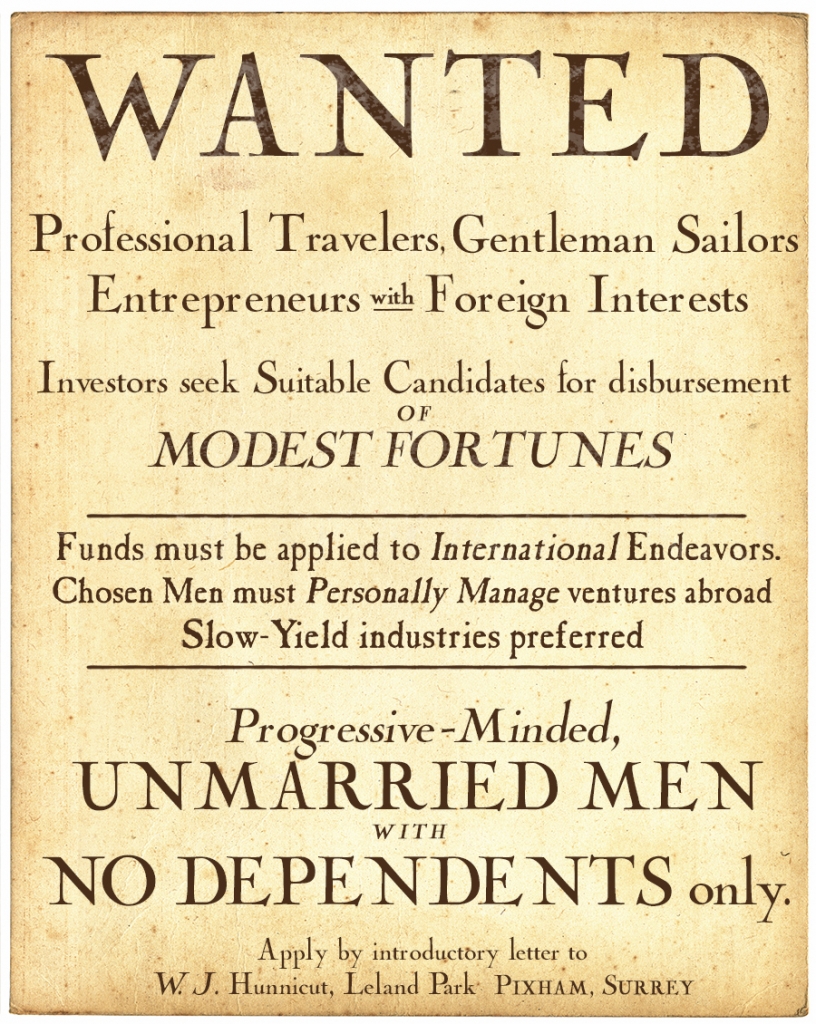
For a long moment, no one spoke. Willow held her breath and glanced at Tessa. Of the two friends, she was more likely to be generous. Now, she remained generously silent.
“What is a ‘gentleman sailor’?” asked Sabine.
“I thought we agreed that it was best to solicit gentlemen,” said Willow.
“This assumes that the advertisement will solicit anyone at all,” said Sabine. “Now ’tis only to be gentlemen who apply?”
“And why shouldn’t we ask for exactly what we want?” said Willow. “ ‘Gentleman sailor’ is an inspired phrase.”
“It’s an imaginary phrase,” said Sabine. “If you mean to ask for exactly what you want, why not say ‘Will Trade Dowry for Absentee Husband’?”
Now Tessa spoke up. “I think it a very . . . dashing advertisement, Willow.”
“Dashing?” Willow repeated dully. “Dashing? It is brilliant, and you both know it. It will solicit hundreds of applications. We’ll interview as many as necessary until we identify the perfect three.” She took up the pen to thicken the letters of her script.
For a long moment, the two other women watched in silence. Finally, Tessa asked, “What if they’re awful, Willow? These men. Will you consider horrible men? Will you consider toads?”
“Toad or not, we’re only meant to endure them long enough to marry them and bid them bon voyage,” said Willow.
“In other words, yes,” Sabine said. “They will be awful. Depend upon it.”
Willow gritted her teeth. “We do not, at present, luxuriate in unlimited options, do we? Tessa, you are in a delicate situation and refuse to appeal to your parents. And you, Sabine?” Willow sighed heavily. “I shudder to think what will come of you if you continue to provoke your uncle.”
Neither friend contradicted her; how could they when she spoke the truth? Willow went on. “And I have the opportunity to follow my passion to London—to actually make something of my life. But as you know, I’ve no acceptable way to make a home there. Not in my current situation: young, female, and alone.
Willow held out her hands, palms up. “As obstacles go, these are considerable, but our fathers settled dowries on us for a reason. Not these reasons, I’ll grant you, but we shall seize what we can. If we cannot buy freedom outright, we shall buy three men desperate enough to marry us and let us go.”
This speech, which had been rehearsed down to the last “desperate enough,” was met with still more silence. Her friends shared a look.
“Might I remind you that I was set to never marry?” Willow added. “For obvious reasons, painful reasons, I had reconciled myself to a life alone. I’ve flipped those intentions to save the two of you—”
“We aren’t denying that you do this to help, Willow . . .” said Sabine, trailing off.
Willow tried again. “I’ve explained that my aunt’s townhouse in Belgravia is large enough for the three of us, and she’s welcomed us all. When we conceived the idea, it was that we would go together.”
“Yes, but conceiving it,” Sabine said, “and actually doing it are . . .” She held out her hands as if the correct words could be snatched from the air. “It’s one thing to discuss the plan in theory, but quite another to post your name and direction in London and invite these men to . . . apply to you. And that’s not the worst of it. It is a gross misrepresentation to refer to my dowry or your dowry as a ‘modest fortune’ to ‘disburse.’ We are not investors, Willow, we are girls who these men—strangers to us—would be forced to marry if they wished to receive one farthing.”
“Not strangers,” corrected Willow.
“Excuse me, these ‘gentleman sailors,’ which, by the way, is not a known distinction.”
“Alright,” Willow agreed, “the plan is wholly outrageous—is this what you wish to hear? If so, I’ll be the first to admit it. But that doesn’t mean it cannot happen. Outrageous is not impossible. Remember Gwen Pierpont? Shall I tell the story again? Gwen married a sea captain who spends years at sea. Years. He is practically never at home in England, and when he is, it is only long enough to provision for his next voyage. Gwen, therefore, has complete freedom to do as she pleases—in London or Surrey or wherever she cares to go. She’s a married woman, and no one says a word against her. Can you imagine answering to no one? She is the happiest woman we know.”
“But married to a man she never sees?” said Tessa, dropping into a chair. “That sounds wretched.”
“You would do well to see fewer men, Tessa,” sighed Sabine, “not more.”
“Sabine, please,” said Willow.
“You’ve said yourself that Tessa does not have the freedom to be selective,” Sabine shot back. “None of us does.”
“I can be selective,” Tessa asserted. “I can select my brother’s friend Randall and marry him. He would marry me tomorrow if I would but say the word.”
In unison, Sabine and Willow said, “You’re not marrying Randall.”
Tessa’s daily threat to marry the dull and dim-witted Randall elicited the reliable chorus of “You’re not marrying Randall.” It was why she had said it. But they could only reassure her for so long. Tessa’s situation was distressing, and it grew more urgent with every passing day.
Sabine said, “Willow, you cannot fault us for wanting more assurance than one neighbor who happened into an absentee marriage with a particularly diligent sea captain. This hardly guarantees our same luck. Especially as we will ‘happen’ into nothing. You’re endeavoring to construct this arrangement. From the start.”
“We will have constructed it together, and good for us,” said Willow. “What choice do you have, Sabine? Tessa’s condition will be obvious to everyone in a matter of months.”
Sabine walked to the window. After a moment, she said, “I would do nearly anything to escape my uncle—you know this—but your plan isn’t something to do, is it?”
“We are doing something,” insisted Willow. “We are soliciting potential husbands.”
“No, you have written this advert, and now we must sit idly by and wait,” said Sabine, turning back. The light from the window illuminated the healing bruise beneath her right eye. “If a stranger eventually writes us, there is a very great risk that he’ll report the scheme to your mother, or Tessa’s parents, or, God forbid, my uncle.” She made an expression of what if? and put a hand to the top of her head. Her hand trailed from her hair and down her face, lingering idly on the healing eye. She looked at Willow. “I cannot.”
“But the men will introduce themselves by letter first, and we shall only meet in person with the candidates who portray themselves as the most fitting and safe. And even then, we shall broach the terms carefully, feeling our way. I’ll not reveal the full extent of the barter unless an applicant appears amenable to a marriage spent in separate corners of the globe.”
“Effective immediately,” said Tessa skeptically.
“And extenuating always,” added Sabine.
Willow carefully replaced her pen. She walked a small circle in the room. What did they want? To be begged? To agree that the whole scheme was a great risk? To snap her fingers and magically produce ideal husbands who would whisk them away from their hopeless situations in Surrey?
She settled each of them with a hard look. “You are running out of time, each in your own way. I’ve the least to lose, but hear me now; this advertisement will go to London tomorrow by Mr. Fisk. Five copies will be posted. The applications will surely follow. After that, I’ll convene interviews. You know me well enough to appreciate my determination. I will marry when the correct man comes along. You may join me with the other men the advert will surely bring, or you may remain in Surrey to deal with your own fates.”
“But Willow,” Sabine asked after a pause. Her voice was softer now, careful. “What about your . . . barrenness? Will you tell him? This correct man, when he comes along—will you tell him?”
Willow looked away. “Of course I will tell him. Immediately, in fact. I’ve always said I would not misrepresent the truth.”
The truth, of course, was the childhood illness that left Willow unable to bear children.
“However,” Willow continued slowly, “it is my great hope that intimate . . . obligations will not be part of our arrangement.”
Sabine made a scoffing noise.
Willow rubbed at an ink stain on her hand. “There is no guarantee, of course. But these men are meant to be out of the country most of our lives. How much of an issue can it be?”
Conjugal relations and children were variables that Willow was not sure she could stipulate. She had shoved aside the notion of the . . . er, marital bed until . . . well, until they were a bit further along in the process.
She looked back to see her friends share a glance, but Sabine leaned down to read the advertisement again. “You sound very determined,” said her friend, finally. “Although I cannot say I am surprised. When you get an idea into your head, you are not one to let it die a natural death, are you?”
“But don’t you see?” said Willow. “This is so much more than an idea. An idea was to paint the dining room orange. An idea was to rebuild the stairs in marble tile. This is the admission to the entire Rest of My Life.”
Sabine chuckled sadly. “But you aren’t being terrorized by a lunatic uncle. Or expecting a child with no father.” She and Willow glanced at Tessa. Rarely did they discuss her predicament in as many words. Tessa dropped her head back and slowly closed her eyes.
“No,” said Willow. “What I seek is the wildest, most brilliant dream I’ve ever known.”
“You want it that bad, do you?”
“It’s only been my passion for as long as I can remember.” Willow paused, waiting for some response. Her friends looked away.
She said, “If I am able to get to London, I will have come all the way back around, don’t you see? Aunt Mary was the start of everything. She was the one who took me in hand, years ago, and taught me how to look for beauty in all things, to curate it, and to apply it to the rooms in which we sleep and eat and live. It’s one thing to be the relation of renowned designers such as Aunt Mary and Uncle Arthur, but to have the two of them invite me to live in their home and be their apprentice? Why, over the next five years, they will design the interiors of the finest, most modern new homes in the city. They could have chosen anyone to assist them, anyone at all, but they chose me. Me.”
“But you’ve not even seen these homes your aunt and uncle will design,” said Sabine. “You’ve not even seen the home in which you are inviting us all to move and start this new life.”
“I don’t need to see them,” said Willow. “If my aunt and uncle say that Belgravia is the height of modish luxury, it will be. The homes of society’s elite are their stock-in-trade. And honestly, I don’t care. Anything would be better than redesigning the same rooms of Leland Park again and again.”
Tessa looked over. “What a great injustice that your mother will not simply allow you to go. Why must you enlist a strange man and marry him, simply to live with your aunt?”
Willow waved the idea away. “Aunt Mary went against the family wishes and married a commoner. She’s been shunned for years. My mother won’t speak of her. It makes no difference that my uncle is a famed furniture craftsman, sought after by the wealthiest families. The notion of my relocating to London as their apprentice is unconscionable.”
Willow drifted to the window and peered out. “As long as I am under my mother’s purview, Belgravia, the design work, leaving Surrey—it is a locked door.” She turned back. “Unless I become a married woman who makes her own decisions. Unless I can come and go as I please—a bride with a long-lost husband, and happily so, living in Belgravia, making all my dreams come true.”
The room was silent again. Sabine walked back to the advert and read it over. Tessa traced a swirly line in the dark-blue velvet of her chair. After a moment, Tessa asked, “What if no one applies, toad or no toad? No one at all?”
Willow shook her head. “This will not happen. We’ve one circumstance working in our favor, and that is the money.” She walked to the massive desk and leaned against it, crossing her arms over her chest. “Life may have disappointed us, each in our own way, but the money, I’m confident, will not let us down.”
. . . . . .
Brent Caulder, the Earl of Cassin, wound his way through the slouching sailors of the Gull and Trident, searching for his partners in the smoky gloom.
“Evenin’, your lordship,” slurred a grime-streaked sailor, swaying in the seat. “Lookin’ for the captain, are ye?”
The earl nodded, trying to place the man among their last crew. While his partner Joseph Chance knew each man by name, and his other partner, Jon Stoker, knew them by trade, they all looked the same to Cassin. His mind was already filled to overflowing with the names and faces of men who considered him their leader and employer, but these men lived two hundred miles away, in Yorkshire, and they waited for him to lead them or employee them. It was a struggle to add twenty more.
The sailor at the door didn’t seem to mind, and he grinned, happy in his drink. He jerked his chin to a rear table, half obscured by the belching hearth. “Not drunk enough yet, I reckon. They’ve only just come in.” He brought the tankard to his mouth, sloshing his beard with foam.
Cassin nodded again and started for the table, stepping over boots and sleeping dogs. Joseph, he now saw, was blocked from view by a trio of barmaids, while Stoker sprawled across two chairs and a trunk, his hat covering his eyes.
“A word, if you please,” Cassin said when he reached them. He scooped up four empty tankards and handed them to the maids. “Ladies, may I trouble you?”
“Bloody hell, Cassin,” said Joseph, scooting back his chair, “I was in the midst of a conversation.”
“No, you were not.”
“The bleeding hell I wasn’t.”
“Flirtation is not a conversation. It’s a transaction.”
“Speak for yourself, Cassin. I don’t rely on negotiation to get a woman into bed.”
“Nor do you rely on speech,” said Jon Stoker from beneath the brim of his hat. Joseph’s blue-eyes had always done the talking for him.
The women accepted the empty tankards and sauntered away while Cassin wiped the wet table with his sleeve.
“Read,” he said, spreading a rolling expanse of parchment next to the dim candle. He took coins from his pockets to weight the corners.
“What’s this?” asked Joseph. “An apothecary cure for your eternal bad mood?”
“Read,” repeated Cassin, thumping the parchment with his finger.
Something about his tone pricked their attention, and Joseph leaned in. Stoker slid his boots from the trunk one by one, taking his time, slouching forward.
“Where did you find this?” asked Joseph.
“Posted above the trough in Redmond Street.”
“Redmond?” mused Joseph. “I know the spot. Wall is littered with bills and notices.”
Stoker shook his head and returned his boots to the trunk. “It’s a fabrication.”
“We’ve no idea what it is,” said Cassin.
“I’d like to know the motive, if it’s a fabrication,” said Joseph. “What value would this”—he leaned in and read the name from the bottom line—“W. J. Hunnicut glean by offering money if he doesn’t have it? Why bother?”
“To steal ideas,” said Stoker, resettling his hat. “Trade secrets.”
“Why does any investor contribute to an endeavor?” said Cassin. “To multiply his money when the investment pays off.”
“Do you know him, Cassin?” asked Joseph. “W. J. Hunnicut?”
Cassin shook his head. He’d assured his friends when he joined the partnership that, despite being an earl, he knew few men among society’s elite. They’d brought him into the business anyway, the poor sods.
Their loose collaboration amounted to Stoker’s ownership of a fast ship and his proficiency as captain, Joseph’s brains and business acumen, and Cassin’s legitimacy as an earl. Albeit an impoverished one. Who hadn’t passed time in London in years. But they had been friends since university and their newly minted partnership, not even a year old, was built on loyalty and shared history.
Their most bankable asset was a shared commodity they’d won in a card game and split three ways. Joseph had played the winning hand, Stoker had loaned him the money, and Cassin had relentlessly pursued the loser, a small-time smuggler and sometime pirate known for shirking his debts. Cassin had hounded him until he’d provided the actual printed deed to the spoils—a small island in the Caribbean Sea, off the coast of Barbadoes.
As partnerships went, Cassin brought the least to the table. But Stoker and Joseph Chance were lowborn scrappers who had risen up in the world, and they were unduly impressed with the title of earl. Stoker and Chance saw Cassin’s title as an open door to richer, more influential clients and investors.
Cassin was doubtful, to say the least, but he would be forever grateful they’d cut him in. Especially now, considering the potential of the island they had won on a lucky turn of cards. Especially if he could bag this investor.
“But why the emphasis on foreign work?” Joseph continued, studying the advertisement again. “Says it in four or five different ways.”
“Perhaps he’s grown weary of the opportunities in England.” Cassin pulled out a chair. “Perhaps he himself is of foreign birth. Perhaps, like us, he knows that the future of successful commerce is beyond this island.”
“Strong words from someone whose own future in this partnership is limited to the first windfall,” said Stoker.
“A windfall I’ve yet to see.” Cassin sighed. He leaned back in his chair and stared down at the advertisement. “I’ve no doubt that the two of you will eventually become richer than your wildest dreams, but I don’t have the leisure of sailing ’round the world indefinitely, waiting for this fortune to come to pass. I’ve responsibilities, as you well know.” He looked back and forth between his friends. “My time is already running out.”
Joseph looked up. “But could it be possible? That the money would be this simple to get?” He read from the advertisement: “ ‘A modest fortune,’ it says. How much could he mean?”
Stoker sat up again. “Not enough to print this advertisement properly. With a press. On good paper.” He ran a finger along the script. “Advertisement’s been hand-lettered on parchment.”
“So it is,” sighed Cassin. He took up. “So what?”
“Did anyone see you pull it down?” asked Joseph.
Cassin shrugged, rolling up the advert. “It’s mine now—the advertisement and the money it will bring.”
“It’s ours, you mean,” said Stoker. “The money would be ours.”
Cassin smiled. “So you are interested?”
“I’m the captain of the bloody ship,” Stoker said. “You deal with the investments.”
He looked back and forth between his partners. “What’s the risk in trying?”
Joseph scratched his head. “Revealing our plans for the island to a competitor. Being made fools if the advert turns out to be a trick or a fabrication, as Stoker said.”
“So nothing, effectively,” said Cassin. “Low risk—very low.”
Stoker laughed. “Aren’t you an eager lad?”
“Eager does not begin to describe what I am.” Cassin sighed. “I’ve been away from home for too many months, with too little to show for the time away. People rely on me.”
“And now you would add Mr. W. J. Hunnicut to that list?” asked Stoker. “Investors expect returns on their money, don’t they?”
“Yes, and the profits from the island are incalculable,” said Cassin. “Joseph has done the projections. All we lack is a financier.” He tucked the advertisement in his coat. “And now, it would appear we have one. If we’re lucky. If we can sell him on the idea.”
“He’s right,” said Joseph. “If it’s authentic, an offer like this is exactly what we’ve been looking for.”
“Tell me this,” said Stoker. “What is a ‘gentleman sailor’?”
“I am,” said Cassin immediately. “I am a gentleman sailor. I’m a bloody earl, and I’ve been sailing with you lot since . . . what was it? June?”
“Well, I’m no gentleman,” said Stoker.
“Nor I,” said Joseph.
“Very well,” said Cassin, “you are ‘Entrepreneurs with International Interests.’ You are ‘Professional Travelers.’ I don’t care how you refer to yourselves, nor do I care if W. J. Hunnicut thinks you are gentlemen or sailors or the bloody Spanish Armada. I only care that he gives us the money so we may mine the island before the market floods, and we’re too late.”
“Why not?” asked Joseph, leaning back, lacing his fingers behind his head. “I can hardly see the harm in writing to the bloke to introduce the idea.”
Cassin shook his head. “No. No letter. There’s no time to exchange correspondence with an old man in godforsaken Surrey. And Stoker is correct: It’s reckless to put pen to paper and describe the potential of the island, only to post it to a stranger.” He kicked Stoker’s leg and gestured for him to sit up.
Leaning in, Cassin spoke low. “We’ll travel in person to Pixham, wherever the devil it is, and see for ourselves. Meet the bloke. Look him in the bloody eye. If W. J. Hunnicut is an honest man with legitimate resources, we’ll know it.”
“And if not?” asked Stoker.
“If not,” said Cassin, “then you may buy me out of the partnership, and I’ll return to Yorkshire. With nothing.”
. . . . . .
Chapter Two
Fifteen days after Lady Willow dispatched Mr. Fisk to London with the advertisement, a lone man arrived on horseback to Leland Park.
“That’s odd,” Willow said, pausing near the window to her workshop. She wrenched open the pane, watching the rider gallop the long, tree-lined drive that stretched from the lane to the manor house.
Willow had spent the morning in the workshop, directing Mr. Simms as he recovered a library chair with bright puce velvet she had ordered from Portugal. Tessa had come for luncheon and never left. Her friend reclined on the chaise longue that would be next to receive the new fabric. It was a pleasant afternoon, unseasonably warm for October, and Tessa had propped open the door to allow for a breeze. The stone outbuilding had been a falconry before Willow had requisitioned it as her workshop, and warm days still evoked the smell of feathers. A fat mama cat stretched half in, half out of the open door while her kittens bounded to and fro.
“What’s odd?” asked Tessa. She dangled a piece of velvet over the alert gaze of a kitten.
“A man on horseback,” said Willow. “Approaching the house.”
“Calling on your mother at the stables, no doubt.”
Willow shook her head. “He is not here about horses, I believe. I’ve never seen him before. And my mother takes appointments in the mornings, when horses are more spirited and there is less chance of rain.”
“Oh, has she bought another stallion? If so, my brothers will call immediately.”
“I cannot say,” Willow mumbled, looking closer. Now the rider slowed to a canter in the circle drive and stared up at the house. She knew enough about horses to see that his mount was strong and solid, a stallion. The animal spun and sidestepped as the man reined it in with skill.
Not a horse person, she thought idly, watching him. Her eyes narrowed. Of course there was no evidence of this; every manner of equine enthusiast called upon the Leland Park stables weekly, sometimes every day, and the disparity in appearance from buyer to breeder was great. And yet . . .
Willow looked again. Two grooms dashed to take his horse as he dismounted, and there was Mr. Fisk, rising up from the flower beds to shade his eyes from the sun. Willow squinted too, trying to discern the man’s age, the quality of his coat and hat, to see his face.
Surely not, she thought. Surely, surely not.
“But is it Mr. Cahill?” asked Tessa, speaking of an elderly neighbor.
“No. Not Cahill,” said Willow. Their neighbor was tall but as thin as a leather strap. This man was substantial. Broad shouldered and thick chested. He dropped from his horse with a thud and stood solidly, scanning the Leland Park grounds.
“Then who?” said Tessa. “Willow, you should see your face.”
Willow shook her head. “Will you help me pick the sawdust from my hair?” She yanked at her muslin apron, pulling it off, and worked the scarf from her head.
“It couldn’t be your brother,” said Tessa. “You’ve said he would not return to England until summer.”
“No,” she said. “Not Phillip.”
Tessa joined her at the window, and they stared as the man clipped up the front steps. Mr. Fisk abandoned the flower bed to greet him.
Thank God for Mr. Fisk, Willow thought. Her late father’s valet had the uncanny ability to be everywhere and nowhere, depending on what any situation required. His usefulness was surpassed only by his loyalty.
Tessa cocked her head. “Oh,” she said, studying the guest. After a beat, she repeated, “Oh.”
So Willow had not imagined it. There was some remarkable sort of . . . differentness about the guest. Tessa was acutely attuned to remarkable men.
Willow, on the other hand, had trained herself to take little notice of men in general and remarkable men in particular. But she could easily spot the odd or the unlikely, and there was something distinctively out of the ordinary about the rider who now stood on her front steps.
While the man spoke to Mr. Fisk, the massive oak front door swung wide, revealing Abbott, the butler. Willow moaned. Where Mr. Fisk could smooth over any situation and buy time, Mr. Abbott disrupted and dismissed.
Mr. Fisk ignored the butler and carried on, gesturing and nodding and ultimately stepping around Abbott and beckoning the man to follow him inside the house.
Willow’s heart jumped again. Now the door shut in the butler’s face, and he stood abandoned on the stoop. He pivoted and glared in the direction of Willow’s workshop. With a grim expression, the butler began the long, determined glide to her.
Willow jerked away from the window, taking Tessa with her. “Tessa,” she whispered, “that man has come about the advertisement.” She looked at her friend. “It could be nothing less.”
“The advertisement?” whispered Tessa.
“The dowries. The Gentleman Sailors.”
They hadn’t discussed the advertisement in ten days at least. Letters had come by post, just as Willow had promised, but the majority of the applicants were unsuitable. If they did not invite caveats or stipulations, they proposed unsuitable ventures, everything from impractical to improbable to illegal. Illiteracy was rife and illegibility the rule. Willow had elected not to mention these to her friends. Where was the value in discussing the wrong applicants until the correct applicants came along?
And now this.
“But have you arranged an interview already?” asked Tessa.
Willow shook her head. “There have been no suitable applicants to speak of. If this man has come about the advertisement, he is here . . . unprovoked.” Willow stared at the open workshop door. The butler would reach them any moment.
“But I don’t understand,” said Tessa. “I thought . . .”
Just then, Abbott stepped into the open door, blocking the sunlight and scattering kittens.
“Begging your pardon, my lady,” intoned the butler, glancing with distaste around the workshop, “a gentleman from London has called.”
“A gentleman?” repeated Willow.
The butler grunted. “Regretfully, I did not ascertain the man’s name, but Mr. Fisk may know it.” Abbott cleared his throat. “I did learn that he requests an appointment with an individual he refers to as ‘W. J. Hunnicut’ . . .”
Here he paused and stared pointedly. Willow blinked, one innocuously gentle bat of her lashes. Shock and wild fear exploded in her chest.
She continued to say nothing, and the butler was forced to go on. “Of his own accord, Mr. Fisk informed us both that ‘W. J. Hunnicut’ was in the falconry at present.” Abbott sneered at the confines of the workshop. “And then he suggested that the man wait in the blue room while ‘W. J. Hunnicut’ was summoned. I take it to mean that the illustrious ‘W.J.’ is you?” He added, “My lady.”
Willow smiled briskly. “Thank you, Abbott. You’ll forgive my oversight. As you may or may not know, W. J. Hunnicut is, in fact, a form of my name, Willow Joy Hunnicut. Mr. Fisk is correct.”
To this, Abbott had no response. It was now his turn to wait.
“Might I ask,” Willow went on, casually folding her scarf, “after the location of my mother?”
“Lady Lytton is on her afternoon ride, I believe.”
“Of course.” Willow’s mother and her grooms exercised chosen horses every afternoon. On a fine day, they had been known to ride the North Downs all the way to Dorking and back.
Willow checked the window. Three hours until the sun set, at least. By some miracle, time was on her side. Not a lot of time. Not enough to conduct any real business. But certainly it was enough time to ascertain whether or not this uninvited man was remotely suitable.
It would have to be enough.
She looked back to Abbott. “If Mr. Fisk has not already done so, please install the gentleman in my father’s library. I will attend them shortly.”
“I beg your pardon?” Abbott said carefully.
Willow turned her back to him to close the window. “The library, if you please, Mr. Abbott.” Her voice was firmer now. She glanced back and Abbott stared. His very posture projected, I will not.
“You may send Perry to attend to us,” Willow added, grasping at straws. Her lady’s maid rarely lent propriety to any given situation, but she would be another female in the room, and Willow was desperate. She added, “Mr. Fisk will linger as well.” In her head, she thought, But you will not.
Abbott did not voice his objection so much as allow his silence to speak .
Willow did the same, dismissing him by ignoring him. When he was gone, she drew her first breath in what felt like five minutes. She glanced at her friend.
“What are you doing?” Tessa whispered. Her voice was somewhere between fear and awe.
I’ve no idea, Willow thought, but she said, “I’m getting married, and moving to London, and making all of my dreams come true. Just as I’ve said.”
. . . . . .
Something, Cassin thought, is not quite right.
He turned a slow circle in the center of a parlor that was so blue, it appeared to be submerged underwater. Blue walls, blue furnishings, blue rugs. Every known shade. He’d been held in the underwater room for more than a half an hour. His coat and gloves and hat had not been taken. Tea had not been offered. Unless he was mistaken, he’d been shown inside by a gardener.
Up and down the main corridor, doors opened and closed, but no one looked in. A scrum of four or five small dogs, little more than scuttling puffs of fur, roamed in and out en masse, alternately sniffing at his boots or barking.
I should have brought my sword, he thought, leaning against the indigo wall. Another dog admitted himself into the room and tapped over to him on sharp, tiny claws. Man and dog studied one another.
“By definition,” Cassin recited to the dog, “golden opportunities feel rare and different.” The dog barked once.
His own Barbadoes venture was nothing if not rare and different. He could allow for some strangeness in order to be granted the same.
“And the villagers didn’t blanch when I asked for W.J. Hunnicut,” Cassin continued to the dog. “Perfectly happy to give directions. No one batted an eye.”
This wasn’t entirely true. The villagers in nearby Pixham had known the surname Hunnicut, but they seemed oddly clueless about the illustrious “W. J.” It had been the first of a growing list of inconsistencies. But the house to which he’d been directed was grand and the grounds expansive. Inside, the art on the walls was valuable, the furnishings fine. The gardener had shown appropriate deference when Cassin presented his card and introduced himself as earl. All of it amounted to precisely what the advertisement had claimed: Here lived an investor with so much money he was looking for new and diverse ways to spend it. If Cassin’s reception had been odd, he had turned up unannounced. With no letter of introduction. He’d caught the old man off guard.
Then again, I am a bloody earl, Cassin thought. And an earl called with no forewarning.
“Begging your pardon, my lord,” said a cheerful voice from the doorway. Cassin turned.
It was the gardener, extending his hand to the corridor. “Sorry to keep you waiting, my lord. Right this way, if you please. And allow me to take your coat and hat.”
Cassin hesitated two beats, exchanged glances with the dog, and followed the man out of the room.
~ End of Excerpt ~
Order your copy of Any Groom Will Do
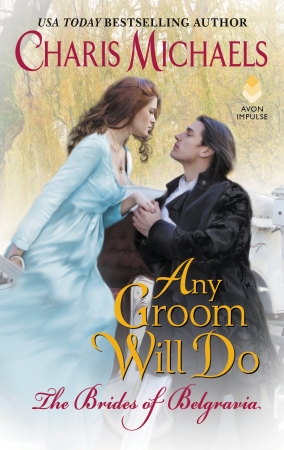
→ As an Amazon Associate I earn from qualifying purchases. I also may use affiliate links elsewhere in my site.
